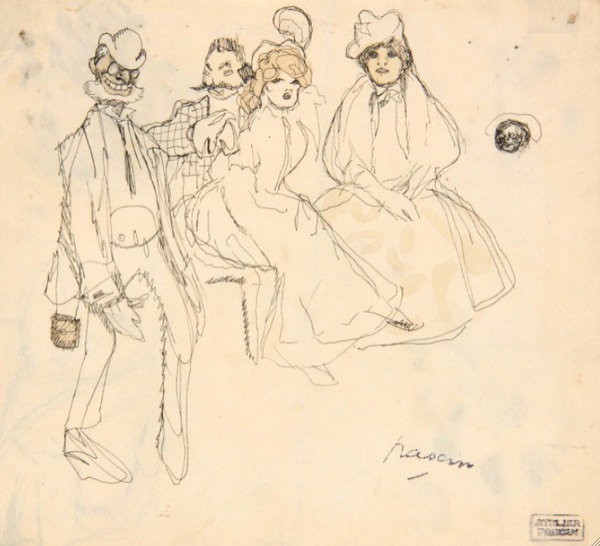Pascin
dal 6/10/2011 al 28/2/2012
Segnalato da
6/10/2011
Pascin
Aktis Gallery, London
Master of Line. The exhibition includes about fifty works on paper, watercolours and drawings, as well as several oil paintings, some of them from the collection of Guy Krogh, the heir to Pascin's work. The artist's farewell letter to Lucy and several richly-illustrated books will complement the exhibition.

Pascin was born Julius Mordecai Pincas in 1885 in Vidin, Bulgaria. His parents were
Sephardic Jews and his father a wealthy grain merchant. Aged 17, he left home to go to art
school in Vienna, living for a while in Budapest, Berlin and Munich. He collaborated with the
renowned German satirical magazine, ‘Simplicissimus’, and later changed his name to Pascin,
an anagram of Pincas.
In 1905, he arrived in Paris, the ‘City of Lights’ and the art capital of the world. Here, he
settled in Montparnasse where he met other artists who had fled Central Europe to avoid anti-
Semitism: Kisling, Chagall, Soutine, Krémègne, along with Modigliani, Vlaminck and later,
Foujita. The group formed what, in 1925, the art critic André Warnod called the “Ecole de
Paris,” and Pascin was one of its leaders. A regular on the Left Bank café circuit, he
warranted a whole chapter in Ernest Hemingway’s Paris memoire, ‘A Moveable Feast.’
Always dressed in black, with a bowler and white scarf, he was a dandy: a prince from the
Orient, who loved women, revelled in the erotic, travelled and, above all, sketched
incessantly. His natural form of expression was drawing: it was his language, his way of
conveying his humour along with his sadness. With a line that was quick and forceful, a
stroke that was swift but sure, he depicted scenes of daily life which he caught by observing
the gestures, attitudes and expressions of his contemporaries. It was people who interested
him; nothing escaped his sharp eye.
In the twenties, Pascin perfected a painting technique using oil diluted in gasoline, creating
mother-of-pearl tones close to those of pastels on a very fine canvas. The result was sensual,
voluptuous and airy: art critics called it his “pearly period”. He did not follow the latest art
trends nor did he belong to any particular movement, seeking above all to remain free and
independent.
Pascin’s love life was tumultuous. He married Hermine David, a miniaturist painter, but was
consumed by a violent and destructive passion for Lucy Krohg, a model at the Académie
Matisse.
Pascin found great success during his life. He was part of the famous Armory Show in New
York in 1913; Flechtheim exhibited his work in Düsseldorf, Bernheim-Jeune in Paris, and
Knoedler in New York. John Quinn collected him, and Mrs. John D. Rockefeller, Jr.,
sponsored his posthumous New York retrospective. Albert Barnes, the famous American
collector, bought a great deal of Pascin's work (which apparently filled the offices and
hallways of his institute) and wrote about it in his 1925 The Art in Painting.
Pascin, who was at the summit of his career and whose talent was recognised by peers,
committed suicide on June 2, 1930 in his Paris atelier. All the galleries closed in a sign of
mourning on the day he was buried, 7 June 1930. It was the end of the crazy years that
marked the “Roaring Twenties”.
The exhibition includes about fifty works on paper, watercolours and drawings, as well as
several oil paintings, some of them from the collection of Guy Krogh, the heir to Pascin's
work. Pascin’s farewell letter to Lucy, and several richly-illustrated books will complement
the exhibition. The exhibition will be accompanied by a scholarly and fully-illustrated
catalogue.
Pascin’s work is represented in numerous museums in America, Europe, Japan and Australia,
including the: Museum of Modern Art, NY; Metropolitan Museum of Art, NY; The Art
Institute of Chicago; The Salomon R. Guggenheim Museum, NY; Nasjonalgalleriet, Oslo;
Musée d’Art Moderne de la ville de Paris; Musée des Beaux Arts de Lyon; Musée d’Art
Moderne, Centre Georges Pompidou
For images and press enquiries, please contact Sophie Money smoney@moneyplusart.com
0207 801 9421 or 07876 402544
Pascin, Two women, two men, 1903, Simplicissimus, Watercolour and ink on paper (15 x 14 cm)
Opening: october 7th, 6 pm
Aktis Gallery
10 Park Place SW1A 1LP - London
Opening hours: Tuesday – Saturday: 10am-2pm; 3pm-6pm



